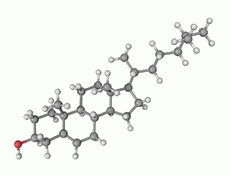What is cholesterol?

Before we consider what cholesterol is, let us say what it is not: Cholesterol is not a fat; it isn't made from fat, not even from saturated fat. Cholesterol is actually an alcohol called a 'lipid alcohol'.
You can be forgiven for thinking that cholesterol is a harmful alien substance that must be avoided at all costs. It isn't!
Cholesterol is found only in animals; there is none in plants. This essential molecule is what makes us different from plants.
- Cholesterol is an essential component in our bodies with a wide range of uses:
- Most body cells have a pre-programmed life; they are being broken down and replaced all the time. Obvious examples of cells being made are finger nails, hair and skin cells, but almost all body cells are replaced many times over during a person's life. Cholesterol is a major building block for this process.
- If you radically restrict your cholesterol intake to the point where there is not enough cholesterol to repair and build tissue, this cell growth and repair is disrupted and you age more quickly.
- All body cells are surrounded by a membrane which is designed to allow nutrients in and keep pathogens out, and also to allow waste products to leave. Cholesterol is vital to maintain cell membranes intact and permeable throughout the body
- About one-fourth of the body's cholesterol is in the brain, where it is essential for nerve transmission. Without this cholesterol we could not form memories; low levels of cholesterol is a risk factor for Alzheimer's disease. Because cholesterol is so important, the brain has its own supply.
- Cholesterol is used to maintain normal hormone production including the sex hormones in both men and women.
- Cholesterol is crucial for the manufacture of the important anti-stress hormone, cortisol.
- Cholesterol is essential for the proper functioning of the immune system.
- Cholesterol is used, in conjunction with sun on the skin, to make Vitamin D3.
- Cholesterol is used to make bile acids, essential for proper digestion of fats and in ridding the body of waste products.
- Cholesterol is found only in animals; there is none in plants. This compound is what makes us different from plants
- Cholesterol not only vital for human health, it is vital for human life itself.
- Not surprisingly, low cholesterol levels in the blood are found to cause many more illnesses and deaths, including heart attacks, than high levels
- The liver's most important function is to make cholesterol. But cholesterol is so important to our bodies that most body cell can synthesize it.
- Cholesterol not only vital for human health, it is vital for life itself.
Does cholesterol really seem such terrible stuff?
You cannot eat too much cholesterol!
Your body can absorb only about 300 mg of cholesterol per day from the foods you eat and, as your body needs many times that amount, it then makes up the difference. If you eat less cholesterol, your body will compensate by making more cholesterol; if you eat more cholesterol, your body will make less. And you can eat foods containing as much as 5 times the usual 300 mg without it having much effect on the amount of cholesterol in your blood. So it doesn't matter how much cholesterol you eat — except for one consideration: Your liver has a great deal of work to do. It is particularly hardworked these days converting all that fructose from five portions of fruit and veg, which is poisonous to our bodies, into glucose which our bodies can use. If you eat more cholesterol, you are doing your liver a big favor: it doesn't have to work anything like as hard.
It has taken over a quarter of a century for it to be realised that you can eat as much cholesterol as you like; many recent studies have confirmed this in the last decade. Yet still the unsupported dogma spews forth from inept practitioners.
See also HDL and LDL: The 'good' and 'bad' cholesterol myth